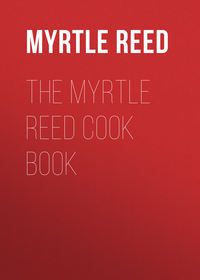 полная версия
полная версияThe White Shield
The pain was almost blinding. She went to the window and looked out. The rising moon shone fitfully upon the white signs of sorrow in the little churchyard far to the left.
She threw a shawl over her head and went out. In feverish haste she walked over to the little "God's Acre" where the Child of Silence was buried.
She found the spot and sat down. A thought of Mrs. Browning's ran through her mind:
"Thank God, bless God, all ye who suffer notMore grief than ye can weep for – "Then someway the tears came, a blessed rush of relief.
"Oh, baby dear," she sobbed, pressing her lips to the cold turf above him, "I wish I were down there beside you, as still and as dreamless as you. You don't know what it means – you never would have known. I'd rather be a stone than a woman with a heart. Do you think that if I could buy death I wouldn't take it and come down there beside you? It hurt me to lose you, but it wasn't the worst. You would have loved me. Oh, my Child of Silence! Come back, come back!"
How long she stayed there she never knew, but the heart pain grew easier after a while. She pressed her lips to the turf again. "Good night, baby dear, good night. I'll come again. You haven't lost your mother even if she has lost you!"
Fred Bennett passed by the unfrequented spot, returning from an errand to that part of town, and he heard the last words. He drew back into the shadow. The slight black figure appeared on the sidewalk a few feet ahead of him and puzzled him not a little. He followed cautiously and finally decided to overtake her. As she heard his step behind her she looked around timidly.
"Mrs. Ward!"
His tone betrayed surprise, and he saw that her eyes were wet and her white, drawn face was tear-stained. She shuddered. A new trouble faced her. How long had he been following her?
He saw her distress and told his lie bravely. "I just came around the corner here."
Her relieved look was worth the sacrifice of his conscientious scruples, he said to himself afterward.
"I may walk home with you, may I not?"
"Certainly."
She took his offered arm and tried to chat pleasantly with her old friend. Soon they reached the gate. She dropped his arm and said good night unsteadily. Bennett could bear it no longer and he took both of her hands in his own.
"Mrs. Ward, you are in trouble. Tell me, perhaps I can help you." She was silent. "Dorothy, you will let me call you so, will you not? You know how much I cared for you in a boy's impulsive fashion, in the old days when we were at school; you know that I am your friend now – as true a friend as a man can be to a woman. Tell me, Dorothy, and let me help you."
There was a rustle of silk on the pavement and her caller of the afternoon swept by without speaking. Already Dorothy knew the story which would be put in circulation on the morrow. Bennett's clasp tightened on her cold fingers. "Tell me, Dorothy, and let me help you!" he said again.
The impulse to tell him grew stronger, and she controlled it with difficulty. "It is nothing, Mr. Bennett, I – I have a headache."
"I see, and you came out for a breath of fresh air. Pardon me. I am sure you will be better in the morning. These cool nights are so bracing. Good night, and God bless you – Dorothy."
Meanwhile Bennett was on his way to Mrs. Brown's cottage. His mind was made up, and he would speak to Jack. He had heard a great deal of idle gossip, and it would probably cost him Jack's friendship, but he would at least have the satisfaction of knowing that he had tried to do something for Dorothy. He rang the bell and Mrs. Brown herself answered it.
"Good evening, Mrs. Brown. No, thank you, I won't come in. Just ask Jack if I may see him a minute on a matter of business."
Ward, hearing his friend's voice, was already at the door.
"I'll be with you in a minute, Fred," he said. "Good night, Mrs. Brown; I am sure we shall get on famously with the duet." And the two men went slowly down the street.
They walked on in silence until Jack said: "Well, Bennett, what is it? You don't call a fellow out like this unless it is something serious."
"It is serious, Jack; it's Dor – it's Mrs. Ward."
"Dorothy? I confess I am as much in the dark as ever."
"It's this way, Jack, she is in trouble."
Ward was silent.
"Jack, you know I'm a friend of yours; I have been ever since I've known you. If you don't take what I am going to say as I mean, you are not the man I think you are."
"Go on, Fred, I understand you. I was only thinking."
"Perhaps you don't know it, but the town is agog with what it is pleased to term your infatuation for Mrs. Brown." Jack smothered a profane exclamation, and Bennett continued. "Dorothy is eating her heart out over the baby. She was in the cemetery to-night sobbing over his grave and talking to him like a mad woman. I came up the back street, and after a little I overtook her and walked home with her. That's how I happen to know. And don't think for a moment that she hasn't heard the gossip. She has, only she is too proud to speak of it. And Jack, old man, I don't believe you've neglected her intentionally, but begin again and show her how much you care for her. Good night."
Bennett left him abruptly, for the old love for Dorothy was strong to-night; not the fitful flaming passion of boyhood, but the deeper, tenderer love of his whole life.
Jack was strangely affected. Dear little Dorothy! He had neglected her. "I don't deserve her," he said to himself, "but I will."
He passed a florist's shop, and a tender thought struck him. He would buy Dorothy some roses. He went in and ordered a box of American Beauties. A stiff silk rustled beside him and he lifted his hat courteously.
"Going home, Mr. Ward? It's early, isn't it?" "But," with scarcely perceptible emphasis, "it's – none – too soon!" Then as her eager eye caught a glimpse of the roses, "Ah, but you men are sly! For Mrs. Brown?"
Jack took his package and responded icily, "No, for Mrs. Ward!" "Cat!" he muttered under his breath as he went out. And that little word in the mouth of a man means a great deal.
He entered the house, and was not surprised to find that Dorothy had retired. She never waited for him now. He took the roses from the box and went up-stairs.
"Hello, Dorothy," as the pale face rose from the pillow in surprise. "I've brought you some roses!" Dorothy actually blushed. Jack hadn't brought her a rose for three years; not since the day the baby was born. He put them in water and came and sat down beside her.
"Dear little girl, your head aches, doesn't it?" He drew her up beside him and put his cool fingers on the throbbing temples. Her heart beat wildly and happy tears filled her eyes as Jack bent down and kissed her tenderly. "My sweetheart! I'm so sorry for the pain."
It was the old lover-like tone and Dorothy looked up.
"Jack," she said, "you do love me, don't you?"
His arms tightened about her. "My darling, I love you better than anything in the world. You are the dearest little woman I ever saw. It isn't much of a heart, dear, but you've got it all. Crying? Why, what is it, sweetheart?"
"The baby," she answered brokenly, and his eyes overflowed too.
"Dorothy, dearest, you know that was best. He wasn't like – " Jack couldn't say the hard words, but Dorothy understood and drew his face down to hers again.
Then she closed her eyes, and Jack held her until she slept. The dawn found his arms around her again, and when the early church bells awoke her from a happy dream she found the reality sweet and beautiful, and the heartache a thing of the past.
The Dweller in Bohemia
The single lamp in "the den" shone in a distant corner with a subdued rosy glow; but there was no need of light other than that which came from the pine knots blazing in the generous fireplace.
On the rug, crouched before the cheerful flame, was a woman, with her elbow on her knee and her chin in the palm of her hand.
There were puzzled little lines in her forehead, and the corners of her mouth drooped a little. Miss Archer was tired, and the firelight, ever kind to those who least need its grace, softened her face into that of a wistful child.
A tap at the door intruded itself into her reverie. "Come," she called. There was a brief silence, then an apologetic masculine cough.
Helen turned suddenly. "Oh, it's you," she cried. "I thought it was the janitor!"
"Sorry you're disappointed," returned Hilliard jovially. "Sit down on the rug again, please, – you've no idea how comfortable you looked, – and I'll join you presently." He was drawing numerous small parcels from the capacious pockets of his coat and placing them upon a convenient chair.
"If one might enquire – " began Helen.
"Certainly, ma'am. There's oysters and crackers and parsley and roquefort, and a few other things I thought we might need. I know you've got curry-powder and celery-salt, and if her gracious ladyship will give me a pitcher, I'll go on a still hunt for cream."
"You've come to supper, then, I take it," said Helen.
"Yes'm. Once in a while, in a newspaper office, some fellow is allowed a few minutes off the paper. Don't know why, I'm sure, but it has now happened to me. I naturally thought of you, and the chafing dish, and the curried oysters you have been known to cook, and – "
Helen laughed merrily. "Your heart's in the old place, isn't it – at the end of your esophagus?"
"That's what it is. My heart moves up into my throat at the mere sight of you." The colour flamed into her cheeks. "Now will you be good?" he continued enquiringly. "Kindly procure for me that pitcher I spoke of."
He whistled happily as he clattered down the uncarpeted stairs, and Helen smiled to herself. "Bohemia has its consolations as well as its trials," she thought. "This would be impossible anywhere else."
After the last scrap of the feast had been finished and the dishes cleared away, Frank glanced at his watch. "I have just an hour and a half," he said, "and I have a great deal to say in it." He placed her in an easy chair before the fire and settled himself on a cushion at her feet, where he could look up into her face.
"'The time has come, the walrus said, to talk of many things,'" quoted Helen lightly.
"Don't be flippant, please."
"Very well, then," she replied, readily adjusting herself to his mood, "what's the trouble?"
"You know," he said in a different tone, "the same old one. Have you nothing to say to me, Helen?"
Her face hardened, ever so slightly, but he saw it and it pained him. "There's no use going over it again," she returned, "but if you insist, I will make my position clear once for all."
"Go on," he answered grimly.
"I'm not a child any longer," Helen began, "I'm a woman, and I want to make the most of my life – to develop every nerve and faculty to its highest and best use. I have no illusions but I have my ideals, and I want to keep them. I want to write – you never can understand how much I want to do it – and I have had a tiny bit of success already. I want to work out my own problems and live my own life, and you want me to marry you and help you live yours. It's no use, Frank," she ended, not unkindly, "I can't do it."
"See here, my little comrade," he returned, "you must think I'm a selfish beast. I'm not asking you to give up your work nor your highest and best development. Isn't there room in your life for love and work too?"
"Love and I parted company long ago," she answered.
"Don't you ever feel the need of it?"
She threw up her head proudly. "No, my work is all-sufficient. There is no joy like creation; no intoxication like success."
"But if you should fail?"
"I shall not fail," she replied confidently. "When you dedicate your whole life to a thing, you simply must have it. The only reason for a failure is that the desire to succeed is not strong enough. I ask no favours – nothing but a fair field. I'm willing to work, and work hard for everything I get, as long as I have the health and courage to work at all."
He looked at her a long time before he spoke again. The firelight lingered upon the soft curves of her throat with a caressing tenderness. Her eyes, deep, dark, and splendid, were shining with unwonted resolution, and her mouth, though set in determined lines, had a womanly sweetness of its own. Around her face, like a halo, gleamed the burnished glory of her hair.
For three long years he had loved her. Helen, with her eyes on things higher than love and happiness, had persistently eluded his wooing. His earnest devotion touched her not a little, but she felt her instinctive sympathy for him to be womanish weakness.
"This is final?" he asked, rising and standing before her.
She rose also. "Yes, please believe me – it must be final; there is no other way. I don't want lovers – I want friends."
"You want me, then, to change my love to friendship?"
"Yes."
"Never to tell you again that I love you?"
"No, never again."
"Very well, we are to be comrades, then?"
She gave him her hand. "Yes, working as best we may, each with the understanding and approval of the other; comrades in Bohemia."
Some trick of her voice, some movement of her hand – those trifles so potent with a man in love – beat down his contending reason. With a catch in his breath, he crushed her roughly to him, kissed her passionately on the mouth, then suddenly released her.
"Women like you don't know what you do," he said harshly. "You hold a man captive with your charm, become so vitally necessary to him that you are nothing less than life, enmesh, ensnare him at every opportunity, then offer him the cold comfort of your friendship!"
He was silent for a breathless instant; then in some measure, his self-control came back. "Pardon me," he said gently, bending over her hand. "I have startled you. It shall not occur again. Good night and good luck – my comrade in Bohemia!"
Helen stood where he had left her until the street door closed and the echo of his footsteps died away. The fire was a smouldering heap of ashes, and the room seemed deathly still. Her cheeks were hot as with a fever, and she trembled like one afraid. It was the first time he had crossed the conventional boundary, and he had said it would be the last, but Love's steel had struck flame from the flint of her maiden soul.
"I wish," she said to herself as she put the room in order, "that I lived on some planet where life wasn't quite so serious."
For his part he was pacing moodily down the street, with his hands in his pockets. Several times he swallowed a persistent lump in his throat. He could understand Helen's ambition, and her revolt against the conventions, but he could not understand her point of view. Even now, he would not admit that she was wholly lost to him. What she had said came back to him with convincing force: "When you dedicate your whole life to a thing, you simply must have it."
"We'll see," he said to himself grimly, "just how true her theory is."
Months passed, and Helen worked hard. She was busy as many trusting souls have been before with "The Great American Novel." She was putting into it all of her brief experience and all of her untried philosophy of life. She was writing of suffering she had never felt, and of love she could not understand.
She saw Frank now and then, at studio teas and semi-Bohemian gatherings, at which the newspaper men were always a welcome feature. There was no trace of the lover in his manner, and she began to doubt his sincerity, as is the way with women.
"So this is Bohemia?" he asked one evening when they met in a studio in the same building as Helen's den.
"Yes, – why not?"
"I was thinking it must be a pretty poor place if this is a fair sample of the inhabitants," he returned easily.
She flushed angrily. "I do not see why you should think so. Here are authors, musicians, poets, painters and playwrights – could one be in better company?"
He paid no attention to her ironical question. "Yes," he continued, "I see the authors. One is a woman – pardon me, a female – who has written a vulgar novel, and gained a little sensational notoriety. The other is a man who paid a fifth-rate publishing house a goodly sum to issue what he calls 'a romance.' The musicians are composers of 'coon songs' even though the African Renaissance has long since waned, and members of theatrical orchestras. The poets have their verses printed in periodicals which 'do not pay for poetry.' The only playwright present has written a vaudeville sketch – and I don't see the painters. Are they painting billboards?"
"Perhaps," said Helen, with exquisite iciness, "since you find us all so far beneath your level, you will have the goodness to withdraw. Your superiority may make us uncomfortable."
Half in amusement, and half in surprise, he left her in a manner which was meant to be coldly formal, and succeeded in being ridiculous.
After a while, Helen went home, dissatisfied with herself, and for the first time dissatisfied with the Bohemia over the threshold of which she had stepped. Always honest, she could not but admit the truth of his criticism. Yet she was wont to judge people by their aspirations rather than by their achievements. "We are all workers," she said to herself, as she brushed her hair. "Every one of those people is aspiring to what is best and highest in art. What if they have failed? Not fame, nor money, but art for art's dear sake. I am proud to be one of them."
In the course of a few weeks the novel was finished, and she subjected it to careful, painstaking revision. She studied each chapter singly, to see if it could not be improved, even in the smallest detail. When the last revision had been made, with infinite patience, she was satisfied. She wanted Frank to read it, but was too proud to make the first overtures towards reconciliation.
The first three publishers returned the manuscript with discouraging promptness. Rejected short stories and verse began to accumulate on her desk. Sunday newspaper specials came home with "return" written in blue pencil across the neatly typed page. Courteous refusal blanks came in almost every mail, and still Helen did not utterly despair. She had put into her work all that was best of her life and strength, and it was inconceivable that she should fail.
Two more publishing houses returned her novel without comment, and with a sort of blind faith, she sent it out again. This time, too, it came back, but with a kindly comment by the reader. "You cannot write until you have lived," was his concluding sentence. Helen sat stiff and still with the letter crumpled in her cold fingers.
Slowly the bitter truth forced itself upon her consciousness. "I have failed," she said aloud, "I have failed – failed – failed." A dry tearless sob almost choked her, and with sudden passionate hatred of herself and her work, she threw her manuscript into the fire. The flames seized it hungrily. Then, someway, the tears came – a blessed rush of relief.
Hilliard found her there when he came at dusk, with a bunch of roses by way of a peace offering. The crumpled letter on the floor and the shrivelled leaves of burned paper in the fireplace afforded him all the explanation he needed. He sat down on the couch beside her and took her trembling hands in his.
The coolness of his touch roused her, and she sighed, burying her tear-stained face in the roses. "I have failed," she said miserably, "I have failed."
He listened without comment to the pitiful little story of hard work and bitter disappointments. "I've given up everything for my art," she said, with a little quiver of the lips, "why shouldn't I succeed in it?"
The temptation to take her in his arms temporarily unmanned him. He left her abruptly and stood upon the hearth rug.
"You are trying to force the issue," he said quietly. "You ar'n't content to be a happy, normal woman, and let art take care of itself. You should touch life at first hand, and you are not living. You are simply associating with a lot of hysterical failures who call themselves 'Bohemians.' Art, if it is art, will develop in whatever circumstances it is placed. Why shouldn't you just be happy and let the work take care of itself? Write the little things that come to you from day to day, and if a great utterance is reserved for you, you cannot but speak it, when the time comes for it to be given to the world."
Helen stared at him for a moment, and then the inner tension snapped. "You are right," she said, sadly, instinctively drawing toward him. "I am forcing the issue."
They stood looking into each other's eyes. Helen saw the strong, self-reliant man who seemed to have fully learned the finest art of all – that of life. She felt that it might be possible to love him, if she could bring herself to yield the dazzling vista of her career. All unknowingly, he had been the dearest thing in the world to her for some little time. Bohemia's glittering gold suddenly became tinsel. There came a great longing to "touch life at first hand."
He saw only the woman he loved, grieved, pained, and troubled; tortured by aspirations she could not as yet attain, and stung by a self-knowledge that came too late. A softer glow came into Helen's face and the lover's blind instinct impelled him toward her with all his soul in his eyes.
"Sweetheart," he said huskily.
Helen stopped him. "No," she said humbly, "I must say it all myself. You are right, and I am wrong. I must live before I am a woman and I must be a woman before I can be an artist. I have cared for you for a long time, but I have been continually fighting against it – I see it all now. I will be content to be a happy woman and let the work take care of itself. Faulty, erring and selfish, I see myself, now, but will you take me just as I am?"
The last smouldering spark of fire had died out and left the room in darkness. Helen's face showing whitely in the shadow was half pleading, and wholly sweet.
Speechless with happiness, he could not move. A thousand things struggled for utterance, but the words would not come. She waited a moment, and then spoke again.
"Have I not humbled myself enough? Is there anything more I can say? I should not blame you if you went away, I know I deserve it all." The old tide of longing surged into the man's pulses again, and broke the spell which lay upon him. With a little cry, he caught her in his arms. She gave her lips to his in that kiss of full surrender which a woman gives but once in her life, then, swinging on silent hinges, the doors of her Bohemia closed forever.
A Minor Chord
One afternoon before Christmas, a man with bowed head and aimless step walked the crowded streets of a city. The air was clear and cold, the blue sky was dazzlingly beautiful, the sun shone brightly upon his way, yet in his face was unspeakable pain.
His thoughts were with the baby daughter whom he had seen lowered into the snow, only a few hours before. He saw it all, – the folds of the pretty gown, the pink rose in the tiny hands, and the happy smile which the Angel of the Shadow had been powerless to take away.
"You will forget," a friend had said to him.
"Forget," he said to himself again and again. "You can't forget your heart," he had answered, "and mine is out there under the snow."
Through force of habit, he turned down the street on which stood the great church where he played the organ on Sundays and festival days. He hesitated a moment before the massive doorway, then felt in his pocket for the key, unlocked the door and went in. The sun shone through the stained glass windows and filled the old church with glory, but his troubled eyes saw not. He sat down before the instrument he loved so well and touched the keys with trembling fingers. At once, the music came, and to the great heart of the organ which swelled with pity and tenderness, he told his story. Wild and stormy with resentment at first, anger, love, passion, and pain blended together in the outburst which shook the very walls of the church.
"God gives us hearts – and breaks them," he thought and his face grew white with bitterness.
Beside himself with passion, he played on, and on, till the sun sank behind the trees and the afternoon shaded into twilight.
As the shadows filled the church, he accidentally struck a minor chord, plaintive, sweet, almost sad.







